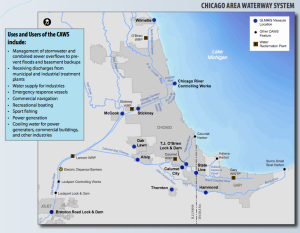Canada has an obligation to help the United States pay for physically separating Lake Michigan and the entire Great Lakes basin from the Mississippi River watershed to contain the spread of Asian carp, though the cost may reach $18 billion or more.
The latest report from the U.S. Army Corps of Engineers released Monday found preventing the aquatic invasive species Asian carp from entering the Great Lakes could cost upwards of $18 billion over 25 years if the most expensive control option is chosen by American lawmakers.
After having spent years studying the growing problem of controlling the aquatic invasive that has wreaked havoc on the ecology of the Mississippi, Illinois and other large U.S. rivers, the Army Corps delivered a report to Congress detailing eight options for action, including maintaining the status quo.
And while the federal engineers stopped short of endorsing a specific course of action as an official recommendation, their report makes clear that doing nothing “not acceptable.”
Rightly so. Current control efforts such as sluices and electric barriers have been reasonably effective at keeping mature bighead, silver and black carp – the most dangerous of the separate species known collectively as Asian carp – at bay, but juvenile fish may still be able to slip through or be released as misidentified bait fish in waters connected to the Great Lakes.
Or they may already be in the Great Lakes. On Jan. 2, the New York Times ran an article featuring scientists and researchers debating the presence of Asian carp in the Great Lakes based on water samples containing their eDNA, all the while bracing for their eventual, and seemingly inevitable, arrival.
Potential solutions outlined in the latest Army Corps report range from non-structural control techniques (netting, electric barriers, herbicides) at an estimated cost of $68 million to a massive infrastructure overhaul that would structurally separate Lake Michigan and the rest of the Great Lakes basin from the extensive Mississippi River watershed at cost of more than $18 billion over 25 years of construction.
The engineers are playing the long game in terms of planning but appear mindful of the urgency of the situation. Many of the structural solutions – control technologies with or without buffer zones or the hydrologic separation of Lake Michigan from the Mississippi River through the Chicago Area Waterway System – are unlikely to reduce the risk of Asian carp and other aquatic nuisance species for the first 25 to 50 years.
The report also outlines in painstaking detail the impact any one solution will have on a litany of uses for the Chicago Area Waterway System (flood risk management, water quality, ecosystem health) and users operating in the region (hydropower operators, commercial and non-commercial navigators.) Each alternatives features a checklist of uses and users who could potentially be impacted. But draw a line in the sand to solve a problem and someone will always be left on the wrong side.
“This report is unique because it identifies a range of options, allows for the incorporation of future technologies, and presents courses of action that may be incorporated now to reduce short-term risk,” said Corps Great Lakes and Ohio River Division Commander Brig. Gen. Margaret W. Burcham in a written statement.
“Aquatic nuisance species prevention is a shared responsibility, and continued engagement will be an essential next step to try to identify and build consensus toward a collaborative path forward.”
Pay now or pay later
Burcham is right in stating the prevention of Asian carp and other nuisance aquatic invasives is a shared responsibility, but she might have taken her plea further. Speaking to U.S. lawmakers, Burcham would have been correct to suggest Canada, too, has a massive interest in keeping Asian carp and other invasives stuck behind a Chicago barrier.
That interest is economic, as well as environmental. With a portion of the $7 billion Great Lakes fishery in jeopardy, uncalculated socio-economic benefits accrued from a healthy basin ecosystem and an interest in continuing to utilize the Mississippi River as a continental shipping route, Ottawa and Queen’s Park cannot afford to pretend they have to use the restroom now that we know how much the cheque will be.
Either way one slices it, Asian carp are already in the Great Lakes or they are pounding on the door. Neither is a good option. And either way, that makes them a massive economic and environmental threat to the state and health of the Great Lakes ecosystem and water beyond. Turning our backs on America now on such a critical issue of shared concern would serve no one’s interests well.
Canadian waters have yet to be devastated by Asian carp, but so what? Scientists and lawmakers alike know they will if given the chance. Canadian governments have ponied up relatively little to date in comparison to their U.S. neighbours, but have contributed what they can in terms of research to determine how effectively Asian carp could survive north of the 49th parallel. Short answer – yes, they can.
These measures have been useful, but the time is coming when cold, hard cash will be needed. And with the report from the Army Corps now in the hands of the U.S. Congress, America will soon have to decide in the midst of a slow economic recovery what it is willing to pay to protect the Great Lakes.
Canada must be there to soften the economic impact of what will become a North American ecological disaster. Saying the problem is an American one is a poor excuse for failing to financially assist the United States in helping to protect shared resources and environment.
We’ll pay now in prevention or pay later for a questionable cure.

Discussion
No comments yet.